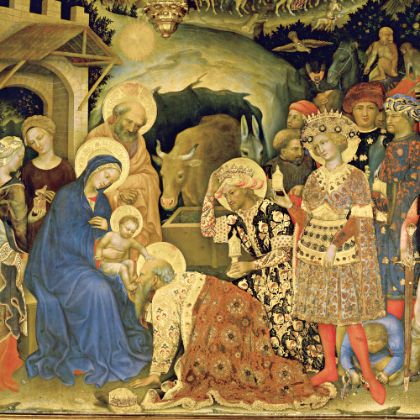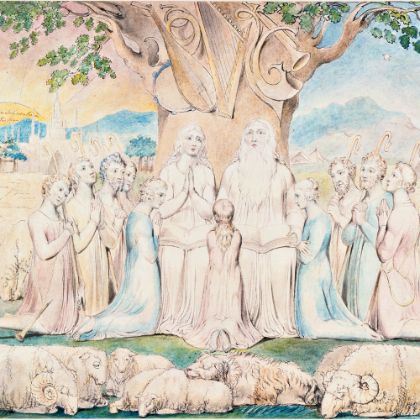In defense of cultural curators
By Damian Fowler
“As long as we feed people buzz, we cannot expect their minds to produce symphonies,” declared Maria Popova, author of the popular literary blog “Brain Pickings,” in her commencement address to the 2016 graduating class of the Annenberg School of Communication at the University of Pennsylvania. Popova is a curator of culture who sifts through the writings of novelists, philosophers and artists to bring us their cherry-picked words of wisdom. “Brain Pickings” has proved an antidote to the often overwhelming glut of information that threatens to engulf our limited attention spans. In her address, Popova made the case that “the role of the curator of culture is to help people discern what matters in the world and why, by steering them away from the meaningless and toward the meaningful.”
If the commercial exigencies of the popular side of the arts — records, movies, books, television shows — have a tendency to pander to the mass market, that’s only to be expected. It’s always been there: the sensation business, the sideshow, the carnival barker, the penny dreadful and the potboiler. Social media, with its obsessive page views, likes and retweets, only amplifies the more attention-grabbing aspects of pop culture. More significantly, it has prompted “a shift of gatekeeping, aka cultural intermediation,” away from the traditional “keepers of culture,” says Toby Miller, professor emeritus of media and cultural studies at UC Riverside.
The long-established gatekeepers of culture — record labels, book publishers, newspapers, magazines and professional critics — no longer wield the same authority they once did. YouTube, Facebook, Instagram and other platforms have allowed people to market themselves directly with instant appraisal from their soon-to-be followers and fans. Meanwhile, for writers, self-publishing offers a chance to circumvent the traditional gatekeeper of the publishing house. Does this imply a new consumer sovereignty? Is there a new ecumenical spirit that allows hitherto undiscovered talent to shine? It has happened before: a young singer makes a record at home, posts it to YouTube, and... a star is born. Justin Bieber, anyone?
And yet there is a downside to this newfound liberation. When it comes to the record industry, for example, the overflow hasn’t led to an embarrassment of riches but a cascade of clutter. The late David Bowie’s longtime producer, Tony Visconti, got to the point during his South by Southwest keynote speech back in March. He argued that the major record labels no longer invest in creativity, no longer nurture talent, and instead throw everything at a handful of top artists with the hope that they’ll break through the morass with a smash hit.“Having five hundred million people who write music and put their song out there... you have all these people competing for a number-one spot out of five hundred million. I call this phenomenon the clogging of the arteries,” he said. Visconti continued his argument, emphasizing that the record industry needs to nurture its artists in order to nurture its business. “The product is culture and the aspect of culture that I’m involved in, that I’m happy about, that I want to see more of, is quality.”
In other words, the record company should ideally act as tastemaker, curator and guardian of what is valuable in culture. Of course, there are good labels out there striving to do just that. A prime example is Nonesuch, which is itself a boutique label inside the behemoth of Warner Music Group. According to the president of Nonesuch,Bob Hurwitz, the record industry is going through a phase “that resembles the 1950s, or the pre–Beatles era,” when the industry was track driven. “It wasn’t really until the period of the Beatles, Brian Wilson, Bob Dylan and the Rolling Stones where the album became a central fixture in the music business,” he says. “The biggest difference between then and now is that there were, in those days, several hundred musicians, or maybe even a thousand musicians, vying for attention and there were gatekeepers who kind of kept that number small. And today there are a hundred thousand musicians all vying for some attention. And it becomes like a Tower of Babel that you can’t discern a common language as easily as you might have done in the past.
But, insists Hurwitz, that’s just the period we’re going through. He fully expects it to change again. “There are people who successfully pursue a career in a track-driven business and the highs are higher, but most of the time they’re more short-lived,” he says. “There are still two hundred people under the age of fifteen today who are going to have very substantial careers without ever doing that.” Nonesuch promotes and supports a diverse range of artists from across all genres — from Chris Thile to Timo Andres to Rhiannon Giddens — by cultivating their musical careers over the years. It’s this kind of old-fashioned sensibility that has given the label its staying power.
Similar shifts are happening in the book publishing industry. Over the last ten years, there has been an astonishing growth in the number of books published in the United States, according to Bowker, the U.S. book-market research firm. There are more than six hundred thousand books published in the United States every year, and more than half of those are now self-published titles. It’s a fair assumption that the majority of these will sell in small numbers. As Nick Morgan commented in a column on Forbes.com: “Your book won’t stand out. Hillary Clinton’s will. Yours won’t.” That’s not to say there aren’t staggering success stories, à la Fifty Shades of Grey. Die-hard believers in the self-publishing model relish the demise of the old-guard publishers, accusing them of being elitist and exclusionary, only in it for themselves. And yet that model of selection and rejection will continue to exist, even if it’s stemming from reviews on Goodreads or Amazon. “I don’t think we know where cultural curation is going to come from,” says Dan Menaker, the former editor in chief of Random House. “We don’t know whether gatekeepers are going to be the publishers, or professors, or tastemakers at the New York Review of Books or the New York Times. My great conviction is that the neo–Leveller model of cultural production is an impossible one,” Menaker says, referring to the seventeenth-century radical political movement in England that believed in popular sovereignty.
When it comes to the record industry, the overflow hasn’t led to an embarrassment of riches, but a cascade of clutter.
In a 2015 Slate essay, “The Gatekeepers,” Menaker argues that a core group of top editors and publishers in New York — along with the ancillary sales and publicity staff a big house offers — serve to support and promulgate the art. He sees them as “the main curators of our life of letters.” “Publishers have to balance their interests between gaining critical respect against the need to move some units; and they often grind against each other.”
Newspapers have also served as an erstwhile cultural bulwark and guide, especially in their arts pages, maintaining the visibility of artists and writers who might not be advantageously backed by the sensation business. It’s well documented that falling circulation figures have taken their toll on American newspapers. Bill Moyers penned a powerful column last March — “What Happens to Journalists When No One Wants to Print Their Words Anymore?” — noting that “what remains of print journalism is shifting, morphing into a loose web of digital outfits populated by a corps of underpaid young freelancers and keyboard hustlers, Twitter fiends, and social-media soothsayers.” And the figures Moyers cites underscore the reality. In 2007, there were fifty-five thousand full-time journalists at nearly fourteen hundred daily papers; in 2015, there were under thirty-three thousand, according to a census by the American Society of News Editors and the School of Journalism and Mass Communication at Florida International University.
What happens when these traditional, community-based publications disappear? What, if anything, will replace the curatorial voice of the local critic? To what extent does this new paradigm create a cultural void, at a time when there is so much stuff to consume? “There are utopic and dystopic aspects of this,” says Toby Miller. If liberation of the unknown voice is the upside of this power shift towards consumer sovereignty, then, says Miller, the downside is the rise of “loud, bullying voices.”
There are deeper dangers when the sensation business runs its mouth without restraint, without the curators of culture and, for that matter, politics. When it comes to news, the loudest voices seem to break through the entropy. They drive the ratings. That’s the prevailing model. Is it an accident that a reality-TV star whose use of social media to shock and offend and provoke his audience finds an echo chamber in a populist-driven culture, one without the shackles of the old-school newspaper editorials? When the inbox and “trending news” feed is deluged with popular” news stories, often poorly sourced, what happens to the informed electorate? “The general fragmentation, or loss of centrality, of the culture because of the internet and social media does tend to give confidence and a weird kind of ‘equality’ to ranters about all subjects, including politics,” says Menaker.
What makes a good curator? Perhaps it is bourgeois to say it, but it must be someone who has good taste, someone who can be trusted by readers, listeners or viewers, and perhaps most importantly, someone who can transcend the exigencies of the moment, the hot demand for clicks and page views, the bankrupt tweets of blowhards, the tyranny of trending. “My view is that I’ll never be able to predict what anyone else likes. And in fact I don’t care what anyone else likes,” says Hurwitz. “I’m never concerned with what my consumer likes. I’m concerned with finding things that are both original in music that I love, and I just make the naïve assumption that there are other people out there who might like the same things. There’s no magic formula.”

-

From Christemasse to Carole
The birth of Christmas in medieval England
Read More
By David Vernier -

The Next (Not-So-)Big Thing
New chamber orchestras are popping up all over America.
Read More
By Colin Eatock -

A Father's Lament
Finding solace in the sound of authentic sorrow
Read More
By Rev. Jake Bohstedt Morrill